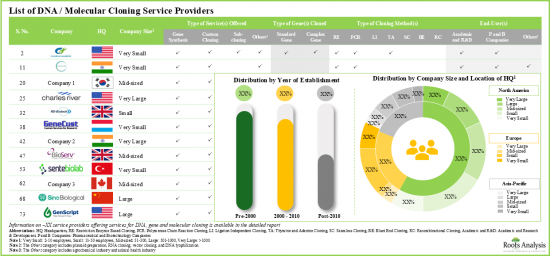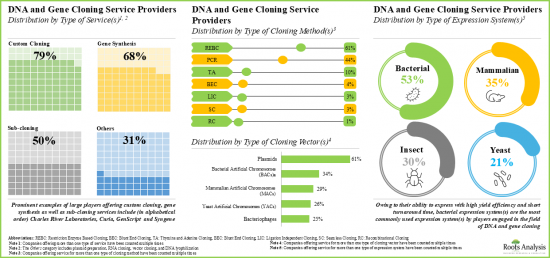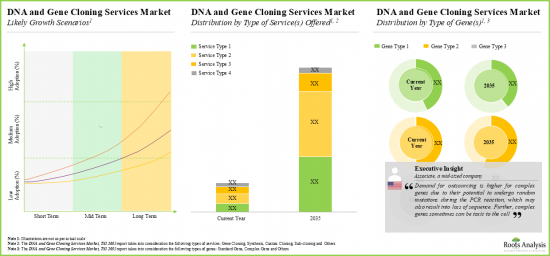
|
시장보고서
상품코드
1771301
DNA 및 유전자 클로닝 서비스 시장 : 업계 동향 및 예측 - 제공 서비스 유형별, 유전자 유형별, 기업 규모별, 최종 사용자 산업별, 주요 지역별DNA and Gene Cloning Services Market: Industry Trends and Global Forecasts - Distribution by Type of Service Offered, Type of Gene, Company Size, End-User Industry, Key Geographical Regions |
||||||
세계의 DNA 및 유전자 클로닝 서비스 시장 : 개요
세계의 DNA 및 유전자 클로닝 서비스 시장 규모는 2035년까지 예측 기간 동안 16.7%의 연평균 복합 성장률(CAGR)로 확대될 전망이며, 현재 31억 2,000만 달러에서 2035년까지 145억 5,000만 달러로 성장할 것으로 예측됩니다.
이 시장 세분화는 시장 규모와 기회 분석을 다음 매개 변수로 구분합니다.
제공 서비스 유형별
- 유전자 합성
- 커스텀 클로닝
- 서브 클로닝
- 기타
유전자 유형별
- 표준 유전자
- 복합 유전자
- 기타
기업 규모별
- 소규모
- 중규모
- 대규모
최종 사용자별
- 학술 및 연구개발
- 제약 및 바이오테크놀러지 기업
- 기타
주요 지역별
- 북미
- 유럽
- 아시아태평양
- 라틴아메리카
- 중동 및 북아프리카
세계의 DNA 및 유전자 클로닝 서비스 시장 : 성장 및 동향
클로닝은 다양한 연구 및 치료 용도에 사용되는 DNA와 유전자의 동일한 복사본을 만드는 과정을 의미합니다. 클로닝과 유전자 공학 기술의 진보로 연구자는 미생물의 게놈을 수정하여 유전자 치료 생산에 사용할 수 있습니다. 이러한 표적 특이적 유전자 치료는 AIDS나 낭포성 섬유증과 같은 심각한 질환의 치료에 있어 큰 가능성을 보여줍니다. 게다가 DNA 및 유전자의 클로닝이 항생 물질, 호르몬, 비타민의 생산에 중요한 역할을 하고 있는 것도 주목할 만합니다. 그 결과 DNA 및 유전자 복제의 다양한 용도를 위해 많은 연구자들이 복제 DNA로 이루어진 유전자 라이브러리 구축에 앞장서 왔습니다. 하지만 DNA 및 유전자 클로닝 과정은 유전자의 독성, 불안정한 DNA 엘리먼트, 특정 유전자 삽입 크기나 벡터의 필요성 등의 복잡성을 초래할 수 있습니다. 이러한 우려에 대처하기 위해 몇몇 이해관계자들은 고품질의 안정적인 최종 제품을 얻기 위해 DNA와 유전자 클로닝을 외부에 위탁하기 시작했습니다.

현재 DNA 클론 수요를 충족시키는 데 필요한 전문 지식과 기술 지원을 갖춘 서비스 제공 업체가이 분야에 몇 가지 존재하고 있습니다. DNA 클로닝 기술에 대한 포괄적인 조사가 이루어지고 있음은 지난 수십 년간 다양한 연구 사이트에서 발표된 6,900개 이상의 연구 논문에서도 분명합니다. 유전자 치료에 대한 지속적인 수요 및 선진적인 DNA 클로닝 기술의 채택 확대로 예측 기간 동안 시장은 안정적인 성장을 이룰 것으로 예측되고 있습니다.
세계의 DNA 및 유전자 클로닝 서비스 시장 : 주요 인사이트
이 조사 보고서는 세계 DNA 및 유전자 클로닝 서비스 시장의 현황을 상세하게 조사하고 업계 내 잠재적인 성장 기회를 확인하고 있습니다. 본 보고서의 주요 조사 결과는 다음과 같습니다.
- 현재 세계 약 80개의 기존 기업이 DNA 및 분자 클로닝 관련 서비스를 제공하고 있다고 주장하고 있습니다. 이들 기업 중 북미에 기반을 둔 소규모 기업이 비교적 큰 비중을 차지하고 있습니다.
- 서비스 제공업체는 그 전문성을 살려, 다양한 유전자의 DNA 및 분자 클로닝 서비스를 제공합니다.

- 경쟁 우위를 구축하기 위해 이 분야의 이해관계자는 서비스 포트폴리오를 강화하고 DNA 및 유전자 클로닝 관련 서비스를 업그레이드하려고 노력하고 있습니다.
- 지난 몇 년간, DNA나 유전자의 클로닝에 초점을 맞춘 논문이 저명한 저자별 다양한 임팩트가 있는 저널에 게재되었습니다.
- DNA 및 유전자 클로닝과 관련된 1,350건 이상의 특허가 이 분야에서 태어난 지적재산을 보호하기 위해 다양한 이해관계자별 출원 및 부여되어 있습니다.
- 클로닝과 관련된 특허의 약 60%는 2018년 이후 학술 관계자뿐만 아니라 다양한 산업계에서도 출원 및 부여되고 있습니다.
- 상대평가가 현저히 높은 특허는 5.5%에 불과합니다. 이것은 주로 최근 출원된 특허의 인용건수가 적기 때문입니다.
- DNA 및 유전자 클로닝 분야에 대한 관심 증가는 여러 이해 관계자가 아이디어를 공유하고 이러한 프로세스에 대해 이해를 깊게 할 기회를 제공하기 위해 개최되는 이벤트에도 반영되어 있습니다.
- DNA 및 유전자 클로닝 서비스에 대한 수요가 높아짐에 따라 시장은 2035년까지 연률 16.7%를 보일 것으로 예측되고 있습니다.

- 현재와 예측되는 장래 시장 기회는 다양한 성장 시나리오, 제공되는 서비스의 유형, 유전자의 유형에 잘 분산될 것으로 예측됩니다.
DNA 및 유전자 클로닝 서비스 세계 시장 : 주요 부문
제공 서비스 유형별로 시장은 유전자 합성, 커스텀 클로닝, 서브클로닝 등으로 구분됩니다. 현재 커스텀 클로닝 분야가 세계의 DNA 및 유전자 클로닝 서비스 시장에서 최대(-50%)의 점유율을 차지하고 있습니다. 또한 커스텀 클로닝은 맞춤형 솔루션의 이점이 높아지고 있기 때문에 커스텀 클로닝 부문은 다른 부문에 비해 빠른 속도로 성장할 가능성이 높습니다.
유전자 유형별로 시장은 표준 유전자, 복합 유전자 및 기타로 구분됩니다. 현재 복합 유전자 부문은 DNA 및 유전자 클로닝 서비스 시장에서 가장 높은 비율(-55%)을 차지하고 있습니다. 게다가 이 부문은 비교적 높은 CAGR로 성장할 가능성이 높습니다.
기업 규모별로 시장은 중소기업, 중견기업, 대기업으로 구분됩니다. 현재 대기업 부문은 DNA 및 유전자 클로닝 서비스 시장에서 최대 점유율(-60%)을 차지하고 있습니다. 또한 장기적으로는 대기업이 큰 성장 가능성을 보이고 있으며, 예측 기간 동안 CAGR은 19.69%로 성장할 전망입니다.
시장은 최종 사용자별로 학술 및 연구개발, 제약 및 바이오테크놀러지, 기타로 구분됩니다. 현재 제약회사 및 바이오테크놀로지 회사는 DNA 및 유전자 클로닝 서비스 시장에서 가장 높은 비중(-60%)을 차지하고 있습니다. 게다가 학술 및 연구개발 분야의 DNA 및 유전자 클로닝 서비스 시장은 비교적 높은 CAGR로 성장할 가능성이 높다는 점은 주목할 만합니다.
주요 지역별로 볼 때 시장은 북미, 유럽, 아시아태평양, 라틴아메리카, 중동, 북아프리카로 구분됩니다. 현재 북미(-60%)가 DNA 및 유전자 클로닝 서비스 시장을 독점하며 최대 수익 점유율을 차지하고 있습니다. 그러나 중동 및 북아프리카 시장은 더 높은 CAGR로 성장할 것으로 예상되고 있습니다.
DNA 및 유전자 클로닝 서비스 시장의 진출기업 예
- Aragen Life Sciences
- Bio-Techne
- Charles River Laboratories
- Curia, Eurofins
- GenScript
- Integrated DNA Technologies
- MedGenome, Sino Biological
- Syngene and Twist Bioscience
본 보고서에서는 세계의 DNA 및 유전자 클로닝 서비스 시장에 대해 조사했으며, 시장 개요와 함께 제공 서비스 유형별, 유전자 유형별, 기업 규모별, 최종 사용자 산업별 동향, 지역별 동향 및 시장 진출기업 프로파일 등의 정보를 제공합니다.
목차
제1장 서문
제2장 주요 요약
제3장 서문
- 장의 개요
- DNA 클로닝 소개
- DNA 클로닝 방법
- DNA 및 유전자 클로닝에 사용되는 기술
- 클로닝된 유전자형
- DNA 및 유전자 클로닝에 사용되는 발현 시스템 유형
- 클로닝 벡터
- DNA 및 유전자 클로닝 용도
- DNA 및 유전자 클로닝과 관련된 과제
- DNA 및 유전자 클로닝 서비스 아웃소싱
- 장래의 전망
제4장 시장 상황 : DNA 및 유전자 클로닝 서비스 제공업체
- 장의 개요
- DNA 및 유전자 클로닝 서비스 : 제공업체의 상황
- DNA 및 유전자 클로닝 서비스 : 시장 상황
제5장 벤치마크 분석
- 장의 개요
- 전제 및 주요 파라미터
- 조사 방법
- 벤치마크 분석 : 피어 그룹
제6장 기업 프로파일
- 장의 개요
- Aragen Life Sciences
- Bio-Techne
- Charles River Laboratories
- Curia
- Eurofins
- GenScript
- Integrated DNA Technologies
- MedGenome
- Sino Biological
- Syngene
- Twist Bioscience
제7장 특허 분석
- 장의 개요
- 범위 및 조사 방법
- DNA 및 유전자 클로닝 : 특허 분석
- DNA 및 유전자 클로닝 : 특허 벤치마킹 분석
- DNA 및 유전자 클로닝 : 특허 평가 분석
- 인용수 상위의 특허
제8장 출판물 분석
- 장의 개요
- 범위 및 조사 방법
제9장 세계 규모의 이벤트 분석
- 장의 개요
- 범위 및 조사 방법
- DNA 및 유전자 클로닝과 관련된 세계적 이벤트 목록
제10장 시장 예측
- 장의 개요
- 예측 조사 방법 및 주요 전제조건
- 세계의 DNA 및 유전자 클로닝 서비스 시장(-2035년)
- DNA 및 유전자 클로닝 서비스 시장 : 제공 서비스 유형별
- DNA 및 유전자 클로닝 서비스 시장 : 클로닝된 유전자 유형별
- DNA 및 유전자 클로닝 서비스 시장 : 기업 규모별
- DNA 및 유전자 클로닝 서비스 시장 : 최종 사용자 산업별
- DNA 및 유전자 클로닝 서비스 시장 : 주요 지역별
제11장 사례 연구 : DNA 및 유전자 클로닝 키트 및 시약
- 장의 개요
- DNA 클로닝 키트
- DNA 클로닝 시약
- 북미의 진출기업
- 유럽의 진출기업
- 아시아태평양 및 기타 지역의 진출기업
제12장 결론
제13장 주요 인사이트
제14장 부록 I : 표 형식 데이터
제15장 부록 II : 기업 및 조직 목록
AJY 25.07.21GLOBAL DNA AND GENE CLONING SERVICES MARKET: OVERVIEW
As per Roots Analysis, the global DNA and gene cloning services market is estimated to grow from USD 3.12 billion in the current year to USD 14.55 billion by 2035, at a CAGR of 16.7% during the forecast period, till 2035.
The market sizing and opportunity analysis has been segmented across the following parameters:
Type of Service Offered
- Gene Synthesis
- Custom Cloning
- Sub-cloning
- Others
Type of Gene
- Standard Gene
- Complex Gene
- Others
Company Size
- Small
- Mid-sized
- Large
End-User
- Academic and R&D
- Pharmaceutical and Biotechnology Companies
- Others
Key Geographical Regions
- North America
- Europe
- Asia-Pacific
- Latin America
- Middle East and North Africa
GLOBAL DNA AND GENE CLONING SERVICES MARKET: GROWTH AND TRENDS
Cloning refers to a process of creating identical copies of DNA and genes that are used in various research and therapeutic applications. Advancements in cloning and genetic engineering techniques enable researchers to modify the genome of microorganisms and use them to produce gene therapies. These target-specific gene therapies have shown significant potential in the treatment of serious disease indications such as AIDS, cystic fibrosis, and others. Moreover, it is worth noting that DNA and gene cloning often play a significant role in the production of antibiotics, hormones, and vitamins. As a result, due to the several applications of DNA and gene cloning, many researchers have taken the initiative to construct gene libraries that comprise cloned DNA. However, the DNA and gene cloning processes may pose complications such as gene toxicity, unstable DNA elements, and the requirement of particular gene insert sizes and vectors. To address the concerns, several industrial stakeholders have begun to outsource DNA and gene cloning to obtain high-quality and stable final products.

Currently, there are several service providers available in the field with the required expertise and technological support to meet the demand for DNA clones. It is worth highlighting here that comprehensive research has been conducted on DNA cloning technologies; this is evident from over 6,900 research articles that have been published on various research websites for DNA cloning technologies in the past few decades. The ongoing demand for gene therapies and the growing adoption of advanced DNA cloning technologies are anticipated to grow the market at a steady rate during the forecast period.
GLOBAL DNA AND GENE CLONING SERVICES MARKET: KEY INSIGHTS
The report delves into the current state of global DNA and gene cloning services market and identifies potential growth opportunities within industry. Some key findings from the report include:
- Presently, around 80 well-established players across the globe claim to offer DNA / molecular cloning associated services; a relatively larger proportion of these players are small companies based in North America.
- Leveraging their expertise, service providers offer different DNA and molecular cloning services for a variety of genes; further, majority (~80%) of the players offer custom cloning services.

- In pursuit of building a competitive edge, stakeholders in this domain are striving to enhance their service portfolio and upgrade their DNA and gene cloning related services.
- Over the past few years, several articles focused on DNA and gene cloning have been published by eminent authors in various high-impact journals; Methods in Molecular Biology emerged as the popular journal with maximum (~310) articles published in the given time period.
- More than 1,350 patents related to DNA and gene cloning have been filed / granted by various stakeholders in order to protect the intellectual property generated within this field.
- Around 60% of the patents related to cloning have been filed / granted by various industries as well as academic players, post 2018.
- Only 5.5% of the patents have a significantly higher relative valuation; this is primarily because of the low number of citations of the patents filed recently.
- The growing interest in the field of DNA and gene cloning is also reflected by the events organized to provide an opportunity for several stakeholders to share their ideas and develop a better understanding of such processes.
- With the rising demand for DNA and gene cloning services, the market is expected to grow at an annualized rate of 16.7%, till 2035.

- The current and projected future market opportunity is likely to be well distributed across various growth scenarios, type of services offered and type of genes.
GLOBAL DNA AND GENE CLONING SERVICES MARKET: KEY SEGMENTS
Custom Cloning Segment Occupies the Largest Share of the DNA and Gene Cloning Services Market
Based on the type of service offered, the market is segmented into gene synthesis, custom cloning, sub-cloning and others. At present, custom cloning segment holds the maximum (~50%) share of the global DNA and gene cloning services market. Additionally, due to the rising advantages of custom cloning in tailored solutions, the custom cloning segment is likely to grow at a faster pace compared to the other segments.
By Type of Gene, Complex Gene Segment is the Fastest Growing Segment of the Global DNA and Gene Cloning Services Market
Based on the type of gene, the market is segmented into standard genes, complex genes and others. Currently, complex genes segment captures the highest proportion (~55%) of the DNA and gene cloning services market. Further, this segment is likely to grow at a relatively higher CAGR.
Large Companies Segment Occupy the Largest Share of the DNA and Gene Cloning Services Market
Based on the company size, the market is segmented into small, mid-sized and large companies. At present, the large companies segment holds the maximum share (~60%) of the DNA and gene cloning services market. In addition, in the long run, large companies have shown significant growth potential and are poised to grow at a CAGR of 19.69% during the forecast period.
By End-User, the Academic and R&D Segment is the Fastest Growing Segment of the DNA and Gene Cloning Services Market During the Forecast Period
Based on the end-user, the market is segmented into academic and R&D, pharmaceutical and biotechnology companies, and others. Currently, the pharmaceutical and biotechnology companies segment captures the highest proportion (~60%) of the DNA and gene cloning services market. Further, it is worth highlighting that the DNA and gene cloning services market for academic and R&D segment is likely to grow at a relatively higher CAGR.
North America Accounts for the Largest Share of the Market
Based on key geographical regions, the market is segmented into North America, Europe, Asia-Pacific, Latin America, and Middle East and North Africa. Currently, North America (~60%) dominates the DNA and gene cloning services market and accounts for the largest revenue share. However, the market in the Middle East and North Africa is expected to grow at a higher CAGR.
Example Players in the DNA and Gene Cloning Services Market
- Aragen Life Sciences
- Bio-Techne
- Charles River Laboratories
- Curia, Eurofins
- GenScript
- Integrated DNA Technologies
- MedGenome, Sino Biological
- Syngene and Twist Bioscience
GLOBAL DNA AND GENE CLONING SERVICES MARKET
- Market Sizing and Opportunity Analysis: The report features an in-depth analysis of the global DNA and gene cloning services market, focusing on key market segments, including [A] type of service offered, [B] type of gene, [C] company size, [D] end-user and [E] key geographical regions.
- Market Landscape: A comprehensive evaluation of DNA cloning and gene cloning service providers, considering various parameters, such as [A] year of establishment, [B] company size, [C] region of headquarters, [D] type of service(s) offered, [E] cloning method(s) used, [F] type of gene(s) cloned, [G] expression system(s) used, [H] cloning vector(s) used and [I] end-user industry.
- Benchmark Analysis: A comprehensive benchmark analysis of the DNA and gene cloning service providers, examining factors, such as [A] number of cloning method(s) used, [B] number of expression system(s) used, [C] number of cloning vector(s) used and [D] number of end-user(s).
- Company Profiles: In-depth profiles of companies engaged in providing services for DNA and gene cloning, focusing on [A] company overview, [B] financial information (if available), [C] service portfolio and [D] recent developments and an informed future outlook.
- Patent Analysis: An in-depth analysis of patents filed / granted till date in the DNA and gene cloning domain, based on various relevant parameters, such as [A] type of patent, [B] publication year, [C] application year, [D] geographical location, [E] CPC symbols, [F] emerging focus area, [G] type of applicant, [H] leading players (in terms of number of patents filed / granted), [I] leading assignees, [J] benchmarking analysis and [K] patent valuation analysis.
- Publication Analysis: An insightful analysis of more than 6,900 peer-reviewed, scientific articles related to research on DNA and gene cloning, based on [A] year of publication, [B] type of cloning, [C] key focus area, [D] popular journals, [E] leading authors and [F] leading first authors.
- Global Event Analysis: A comprehensive analysis of recent events related to DNA and gene cloning that were organized / planned, based on relevant parameters, such as [A] year of occurrence of the event, [B] event platform, [C] type of event, [D] geographical distribution, [E] emerging agendas / key focus areas, [F] most active event speakers (in terms of number of events), [G] seniority level of event speakers and [H] geographical mapping of the upcoming events.
- Case Study: A detailed discussion on the DNA cloning kits developers, based on various parameters, such as [A] kit components, [B] number of reactions, [C] type of cloning method used, [D] type of fragment(s) cloned, [E] cloning time, [F] efficacy and [G] kit shelf life. Additionally, it also includes a detailed study on the DNA cloning reagents developers, based on [A] reagents' unit size, [B] concentration, [C] components of reagents, [D] exonuclease activity, [E] product overhangs, [F] heat inactivation temperature and [G] storage temperature.
KEY QUESTIONS ANSWERED IN THIS REPORT
- How many companies are currently engaged in this market?
- Which are the leading companies in this market?
- What factors are likely to influence the evolution of this market?
- What is the current and future market size?
- What is the CAGR of this market?
- How is the current and future market opportunity likely to be distributed across key market segments?
REASONS TO BUY THIS REPORT
- The report provides a comprehensive market analysis, offering detailed revenue projections of the overall market and its specific sub-segments. This information is valuable to both established market leaders and emerging entrants.
- Stakeholders can leverage the report to gain a deeper understanding of the competitive dynamics within the market. By analyzing the competitive landscape, businesses can make informed decisions to optimize their market positioning and develop effective go-to-market strategies.
- The report offers stakeholders a comprehensive overview of the market, including key drivers, barriers, opportunities, and challenges. This information empowers stakeholders to stay abreast of market trends and make data-driven decisions to capitalize on growth prospects.
ADDITIONAL BENEFITS
- Complimentary PPT Insights Packs
- Complimentary Excel Data Packs for all Analytical Modules in the Report
- 15% Free Content Customization
- Detailed Report Walkthrough Session with Research Team
- Free Updated report if the report is 6-12 months old or older
TABLE OF CONTENTS
1. PREFACE
- 1.1. Scope of the Report
- 1.2. Research Methodology
- 1.2.1. Research Assumptions
- 1.2.2. Project Methodology
- 1.2.3. Forecast Methodology
- 1.2.4. Robust Quality Control
- 1.2.5. Key Considerations
- 1.2.5.1. Demographics
- 1.2.5.2. Economic Factors
- 1.2.5.3. Government Regulations
- 1.2.5.4. Supply Chain
- 1.2.5.5. COVID Impact / Related Factors
- 1.2.5.6. Market Access
- 1.2.5.7. Healthcare Policies
- 1.2.5.8. Industry Consolidation
- 1.3 Key Questions Answered
- 1.4. Chapter Outlines
2. EXECUTIVE SUMMARY
3. INTRODUCTION
- 3.1. Chapter Overview
- 3.2. Introduction to DNA Cloning
- 3.3. Methods of DNA Cloning
- 3.3.1. Restriction Enzyme Based Cloning
- 3.3.2. PCR Cloning
- 3.3.3. Ligation Independent Cloning
- 3.3.4. TA Cloning
- 3.3.5. Blunt End Cloning
- 3.3.6. Seamless Cloning
- 3.3.7. Recombinational Cloning
- 3.4. Techniques Used in DNA and Gene Cloning
- 3.4.1. Molecular Cloning
- 3.4.2. Genetic Synthesis
- 3.4.3. Custom Cloning
- 3.5. Types of Genes Cloned
- 3.5.2. Standard Genes
- 3.5.3. Complex Genes
- 3.6. Type of Expression Systems Used in DNA and Gene Cloning
- 3.6.1. Mammalian Expression System
- 3.6.2. Insect Expression System
- 3.6.3. Bacterial Expression System
- 3.6.4. Plant Expression System
- 3.6.5. Yeast Expression System
- 3.7. Cloning Vectors
- 3.7.1. Plasmids
- 3.7.2. Bacteriophages
- 3.7.3. Bacterial Artificial Chromosomes (BACs)
- 3.7.4. Yeast Artificial Chromosomes (YACs)
- 3.7.5. Mammalian Artificial Chromosomes (MACs)
- 3.8. Applications of DNA and Gene Cloning
- 3.8.1. Gene Synthesis
- 3.8.2. Gene Expression
- 3.8.3. Vaccine Research
- 3.8.4. Gene Therapy
- 3.8.5. Genomic Library
- 3.9. Challenges associated with DNA and Gene Cloning
- 3.10. Outsourcing of DNA and Gene Cloning Services
- 3.11. Future Perspectives
4. MARKET LANDSCAPE: DNA and Gene Cloning Service Providers
- 4.1. Chapter Overview
- 4.2. DNA and Gene Cloning Service Providers Landscape
- 4.2.1. Analysis by Year of Establishment
- 4.2.2. Analysis by Company Size
- 4.2.3. Analysis by Region of Headquarters
- 4.2.4. Analysis by Company Size and Region of Headquarters
- 4.3. DNA and Gene Cloning Services: Overall Market Landscape
- 4.3.1. Analysis by Type of Service(s) Offered
- 4.3.2. Analysis by Cloning Method(s) Used
- 4.3.3. Analysis by Type of Gene(s) Cloned
- 4.3.4. Analysis by Expression System(s) Used
- 4.3.5. Analysis by Cloning Vector(s) Used
- 4.3.6. Analysis by End User
5. BENCHMARK ANALYSIS
- 5.1. Chapter Overview
- 5.2. Assumptions and Key Parameters
- 5.3. Methodology
- 5.4. Benchmark Analysis: Peer Groups
- 5.4.1. Benchmark Analysis: North America (Peer Group I)
- 5.4.2. Benchmark Analysis: North America (Peer Group II)
- 5.4.3. Benchmark Analysis: North America (Peer Group III)
- 5.4.4. Benchmark Analysis: Europe (Peer Group IV)
- 5.4.5. Benchmark Analysis: Europe (Peer Group V)
- 5.4.6. Benchmark Analysis: Asia-Pacific and Rest of the World (Peer Group VI)
- 5.4.7. Benchmark Analysis: Asia-Pacific and Rest of the World (Peer Group VII)
6. COMPANY PROFILES
- 6.1. Chapter Overview
- 6.2. Aragen Life Sciences
- 6.2.1. Company Overview
- 6.2.2. Service Portfolio
- 6.2.3. Recent Developments and Future Outlook
- 6.3. Bio-Techne
- 6.3.1. Company Overview
- 6.3.2. Financial Information
- 6.3.3. Service Portfolio
- 6.3.4. Recent Developments and Future Outlook
- 6.4. Charles River Laboratories
- 6.4.1. Company Overview
- 6.4.2. Financial Information
- 6.4.3. Service Portfolio
- 6.4.4. Recent Developments and Future Outlook
- 6.5. Curia
- 6.5.1. Company Overview
- 6.5.2. Service Portfolio
- 6.5.3. Recent Developments and Future Outlook
- 6.6. Eurofins
- 6.6.1. Company Overview
- 6.6.2. Financial Information
- 6.6.3. Service Portfolio
- 6.6.4. Recent Developments and Future Outlook
- 6.7. GenScript
- 6.7.1. Company Overview
- 6.7.2. Financial Information
- 6.7.3. Service Portfolio
- 6.7.4. Recent Developments and Future Outlook
- 6.8. Integrated DNA Technologies
- 6.8.1. Company Overview
- 6.8.2. Service Portfolio
- 6.8.3. Recent Developments and Future outlook
- 6.9. MedGenome
- 6.9.1. Company Overview
- 6.9.2. Service Portfolio
- 6.9.3. Recent Developments and Future Outlook
- 6.10. Sino Biological
- 6.10.1. Company Overview
- 6.10.2. Service Portfolio
- 6.10.3. Recent Developments and Future Outlook
- 6.11. Syngene
- 6.11.1. Company Overview
- 6.11.2. Financial Information
- 6.11.3. Service Portfolio
- 6.11.4. Recent Developments and Future Outlook
- 6.12. Twist Bioscience
- 6.12.1. Company Overview
- 6.12.2. Financial Information
- 6.12.3. Service Portfolio
- 6.12.4. Recent Developments and Future Outlook
7. PATENT ANALYSIS
- 7.1. Chapter Overview
- 7.2. Scope and Methodology
- 7.3. DNA and Gene Cloning: Patent Analysis
- 7.3.1. Analysis by Publication Year
- 7.3.2. Analysis by Application Year
- 7.3.3. Analysis by Annual Number of Granted Patents and Patent Applications
- 7.3.4. Analysis by Geographical Location
- 7.3.5. Analysis by CPC Symbols
- 7.3.6. Analysis by Focus Area
- 7.3.7. Analysis by Type of Applicant
- 7.3.8. Leading Players: Analysis by Number of Patents
- 7.3.9. Leading Individual Assignees: Analysis by Number of Patents
- 7.4. DNA and Gene Cloning: Patent Benchmarking Analysis
- 7.4.1. Analysis by Patent Characteristics
- 7.5. DNA and Gene Cloning: Patent Valuation Analysis
- 7.6. Leading Patents by Number of Citations
8. PUBLICATION ANALYSIS
- 8.1. Chapter Overview
- 8.2. Scope and Methodology
- 8.2.1. Analysis by Year of Publication
- 8.2.2. Analysis by Type of Cloning
- 8.2.3. Word Cloud: Emerging Focus Areas
- 8.2.4. Popular Journals: Analysis by Number of Publications
- 8.2.5. Leading Authors: Analysis by Number of Publications
- 8.2.6. Leading First Authors: Analysis by Number of Publications
9. GLOBAL EVENT ANALYSIS
- 9.1. Chapter Overview
- 9.2. Scope and Methodology
- 9.3. List of Global Events related to DNA and Gene Cloning
- 9.3.1. Analysis by Year of Event
- 9.3.2. Analysis by Event Platform
- 9.3.3. Analysis by Type of Event
- 9.3.4. Analysis by Geography
- 9.3.5. Word Cloud: Evolutionary Trends in Event Agenda / Key Focus Area
- 9.3.6. Most Active Participants: Analysis by Number of Events
- 9.3.7. Analysis by Seniority Level of Event Speakers
- 9.3.8. Geographical Mapping of Upcoming Events
10. MARKET FORECAST
- 10.1. Chapter Overview
- 10.2. Forecast Methodology and Key Assumptions
- 10.3. Global DNA and Gene Cloning Services Market, Till 2035
- 10.3.1. DNA and Gene Cloning Services Market: Distribution by Services Offered
- 10.3.1.1. DNA and Gene Cloning Services Market for Gene Synthesis, Till 2035
- 10.3.1.2. DNA and Gene Cloning Services Market for Custom Cloning, Till 2035
- 10.3.1.3. DNA and Gene Cloning Services Market for Sub-cloning, Till 2035
- 10.3.1.4. DNA and Gene Cloning Services Market for Other Services, Till 2035
- 10.3.2. DNA and Gene Cloning Services Market: Distribution by Type of Genes Cloned
- 10.3.2.1. DNA and Gene Cloning Services Market for Standard Gene, Till 2035
- 10.3.2.2. DNA and Gene Cloning Services Market for Complex Gene, Till 2035
- 10.3.2.3. DNA and Gene Cloning Services Market for Other Genes, Till 2035
- 10.3.3. DNA and Gene Cloning Services Market: Distribution by Company Size
- 10.3.3.1. DNA and Gene Cloning Services Market for Small Companies, Till 2035
- 10.3.3.2. DNA and Gene Cloning Services Market for Mid-sized Companies, Till 2035
- 10.3.3.3. DNA and Gene Cloning Services Market for Large Companies, Till 2035
- 10.3.4. DNA and Gene Cloning Services Market: Distribution by End User Industry
- 10.3.4.1. DNA and Gene Cloning Services Market for Academic and R&D, Till 2035
- 10.3.4.2. DNA and Gene Cloning Services Market for Pharmaceutical and Biotechnology Companies, Till 2035
- 10.3.4.3. DNA and Gene Cloning Services Market for Other End Users, Till 2035
- 10.3.5. DNA and Gene Cloning Services Market: Distribution by Key Geographical Regions
- 10.3.5.1. DNA and Gene Cloning Services Market in North America, Till 2035
- 10.3.5.2. DNA and Gene Cloning Services Market in Europe, Till 2035
- 10.3.5.3. DNA and Gene Cloning Services Market in Asia-Pacific, Till 2035
- 10.3.5.4. DNA and Gene Cloning Services Market in Latin America, Till 2035
- 10.3.5.5. DNA and Gene Cloning Services Market in MENA, Till 2035
- 10.3.1. DNA and Gene Cloning Services Market: Distribution by Services Offered
11. CASE STUDY: DNA AND GENE CLONING KITS AND REAGENTS
- 11.1. Chapter Overview
- 11.2. DNA Cloning Kits
- 11.2.1. Analysis by Kit Components
- 11.2.2. Analysis by Number of Reactions
- 11.2.3. Analysis by Type of Cloning Method Used
- 11.2.4. Analysis by Type of Fragment(s) Cloned
- 11.2.5. Analysis by Cloning Time
- 11.2.6. Analysis by Efficacy
- 11.2.7. Analysis by Kit Shelf Life
- 11.3. DNA Cloning Reagents
- 11.3.1. Analysis by Unit Size
- 11.3.2. Analysis by Reagent Concentration
- 11.3.3. Analysis by Reagent Components
- 11.3.4. Analysis by Exonuclease Activity
- 11.3.5. Analysis by Product Overhangs
- 11.3.6. Analysis by Heat Inactivation Temperature
- 11.3.7. Analysis by Storage Temperature
- 11.4. Players in North America
- 11.4.1. DNA Cloning Kit Developers
- 11.4.2. DNA Cloning Reagent Developers
- 11.4.3. DNA Cloning Service Providers
- 11.5. Players in Europe
- 11.5.1. DNA Cloning Kit Developers
- 11.5.2. DNA Cloning Reagent Developers
- 11.5.3. DNA Cloning Service Providers
- 11.6. Players in Asia-Pacific and Rest of the World
- 11.6.1. DNA Cloning Kit Developers
- 11.6.2. DNA Cloning Reagent Developers
- 11.6.3. DNA Cloning Service Providers


















